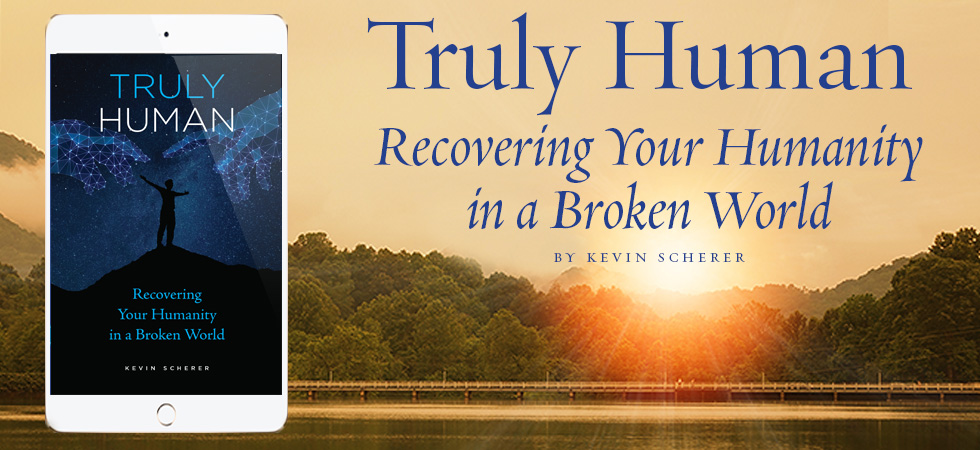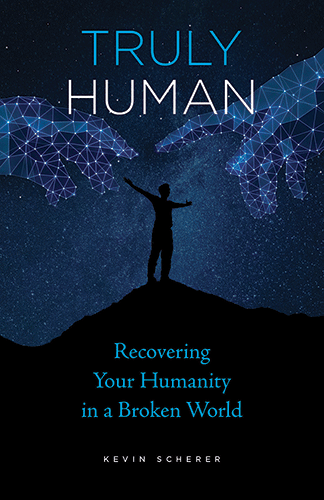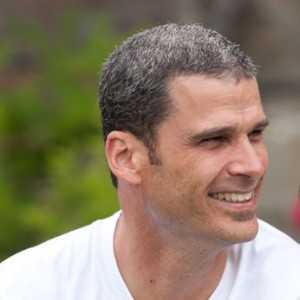My dear friend Kevin Scherer has written an important book. I was honored to be an early reader for Truly Human. Today I’m sharing the review I posted on Amazon for Kevin’s wonderful book, TRULY HUMAN: RECOVERING YOUR HUMANITY IN A BROKEN WORLD.

In Truly Human Kevin “retraces the steps of humanity” from the Garden of Eden (first three chapters of Genesis) through the actions and emotions of the humans at “the pit” at Ground Zero in New York City, saying:
“Someone who is truly human will manifest the activities, or energies, of God in their life.”
But most of the time we don’t manifest those energies. Why not?
He lays out in clear theological and psychological terms what man’s condition is, why we are the way we are, and how we can own our brokenness and find healing. Along the way he deals with some tough topics, including a straight-forward answer to a universal question:
“Why is there evil?” And, if a good God exists, “Why does He allow it?” If we are made in the image of an intelligent God, these are fair and reasonable questions, and the same scripture that informs these questions also gives us the answers…. We know from the first three chapters of Genesis that God created only what was good. It’s the human distortion of this good that we call evil. God allows this distortion, because to prevent it would require Him to restrict our free will, and without free will love and relationships are impossible.”
I’ve always struggled with why God allows suffering, but Kevin puts it in a clear light for me, helping me accept its place in my life. He describes the cycle of suffering that we are caught in because of the fall: victimization, survival, and perpetration—especially as parents:
“Despite our parents’ deep love for us, they were trying to survive their own pains and suffering. As a result, sometimes we were the emotional victims of their coping mechanisms. They, like us, didn’t set out to harm anyone else, but the reality is that they did, and we do too. When we can face up to the reality that we often victimize others in an attempt to manage our own pain, we reach a spiritual turning point.”
I have already worked through a lifelong process of forgiving my mother for her verbal and emotional abuse of me, but this insight also helps me forgive myself for the ways I failed my own children. And in recent years, I’ve begun to embrace suffering on a very small scale. Kevin’s words help me continue the process:
“Ultimately, the goal is not to remove suffering from our lives, but to transform it into a redemptive experience. Like Christ on the cross, we can abandon ourselves to the will of God and offer up our suffering in anticipation of His mercy. In these moments, we become truly human.”
 In Chapter 3, “The Logic of Suffering,” Kevin takes this experience further:
In Chapter 3, “The Logic of Suffering,” Kevin takes this experience further:
“The personal experience of suffering begins when we perceive that our reality is unbearable and out of control. Our perceptions give way to feelings. Generally, when we feel out of control it triggers a self-protective and aggressive emotional response—fear, frustration, anger, bitterness, resentment, etc. These feelings can be directed outward or inward, but they are always characterized by a deep dissatisfaction with the way things are.”
That dissatisfaction often leads, as Kevin explains, to our lives being controlled by vices, rather than by living as truly humans:
“The experience and living out of these vices is the story of humanity. By understanding the psycho-logics and interconnectedness of these vices, we will begin to see the areas of our own life in need of healing and develop a deeper empathy and compassion for others who struggle with them.”
Here’s an excellent description of how the vices work together against us:
“Gluttony, lust, and greed are vicious thinking patterns targeted at how we relate to food, people, and possessions. These vices comfort the pain of our broken emptiness and give us the illusion of an identity. These vices are fueled by, and in turn produce, vanity and pride. And when the first three vices inevitably fail to satisfy the God-given longing in our hearts, they produce the vices of anger and self-pity which, if left unchecked, leads to the vice of despair. This cycle perpetually feeds itself and leads its victims into a deeper and deeper experience of hell on earth.”
So how do we “wake up” from this cycle and move towards becoming the human beings we are meant to be? Kevin says it starts with building a personal inventory (sounds a bit like a twelve steps program, but it’s so much more):
“There are five basic questions we can begin using immediately to build a personal inventory. I call them Identity Paths. These questions act like paths that lead us back to what we really believe about ourselves—the truth and the lies. When used in conjunction with the psycho-logic model, explained in chapter three, they can help us embrace the distortions of our lives and who we’ve become.”
Scherer outlines these questions in the book, and suggests we ask them in a specific way in the presence of a friend, pastor, therapist, family member, etc. In the Orthodox Church—of which he and I are both members—this is available in the sacrament of confession, in which I continue to find healing on a regular basis. But it’s also available through professional counselors, trusted friends, and family members. Kevin describes the healing provided by the church in Chapter 6, “Checking Yourself In,” where he talks about the importance of the church being a spiritual hospital.
And then in Chapter 7 he moves us from the church to the outside world in “Giving Your Life Away,” with the importance of reaching out to those in need, to the poor and suffering in the world. His personal stories of working as a volunteer at Ground Zero in New York City after 9/11, and also on the campus of Virginia Tech after the shootings there, as well as leading young people on pilgrimages to help others in various places around the world are real-life testimonies to the way these interactions can change our lives:
“I’ve discovered that the Christian life can only be fulfilled in sacrificial acts of love. Everything else is just talk. Love is our human vocation, and it is most perfectly revealed on the cross.”
He has helped the young people he has worked with see everyone—especially the poor and homeless—as “real people” and not just random faces:
“We must be willing to take the time and emotional energy to see people for who they really are and the situations in which they really live. We must seek to love real people, not caricatures—“for he who does not love his brother whom he has seen, how can he love God whom he has not seen?” (1 John 4:20).”
Kevin takes us a step further by helping us learn to control our minds, to stay in the present, where the real work of becoming human happens:
“Our broken humanity has lost its natural intuition and no longer knows what to do with the present moment. The mind is designed by God to be active. It is the organ He gave us to be co-creators with Him. With our minds we learn, solve, and plan. In the case of the past or the future, our minds race endlessly to solve the problems of our anxieties and fears.
With the present moment, however, our minds are confused as to what should be done. Unless there is a clear and imposing objective, our minds naturally speed past the present moment toward the areas of greatest pleasure or pain. In the case of pleasure, the mind races to clear the path or duplicate the experience; and in the case of pain, it seeks to alleviate the stress and discomfort of psychological/emotional equilibrium—they are both distorted survival mechanisms.
In order to fully recover our humanity, we must regain control over our minds. The first step in this realignment operation is to help our minds stay in the present moment.”
 This book isn’t just for Orthodox Christians, or any “brand” of Christians. It’s for everyone who is open to understanding why we are the way we are, and how we can change and become the humans God intended us to be. I can’t recommend it highly enough. BUY IT NOW. READ IT. SHARE IT.
This book isn’t just for Orthodox Christians, or any “brand” of Christians. It’s for everyone who is open to understanding why we are the way we are, and how we can change and become the humans God intended us to be. I can’t recommend it highly enough. BUY IT NOW. READ IT. SHARE IT.
Kevin Scherer is a writer and speaker with twenty years of pastoral counseling experience. As a former evangelical pastor and Eastern Orthodox priest, he has pastored in seven churches and served as the executive director of two nationwide Christian ministries. He also served as a chaplain at Ground Zero following the events of 9/11 as well as the Virginia Tech and Northern Illinois University shootings.
Sounds like a good read to help us get through this world of trials and tribulations.. As usual a great blog with your review of his book.
Kevin is a special person, and this book is amazing. If you read it, please let me know what you think!